(完整版)中考重点单词短语+用法归类+易混淆词辨析
(完整版)易混词和词组辨析参考资料
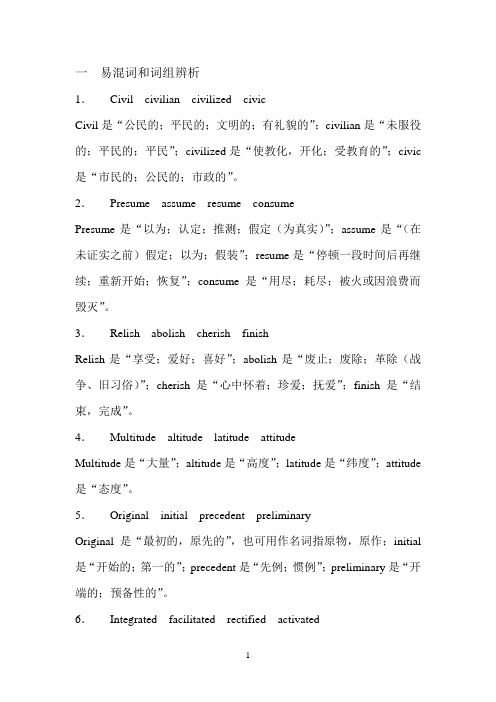
一易混词和词组辨析1.Civil civilian civilized civicCivil是“公民的;平民的;文明的;有礼貌的”;civilian是“未服役的;平民的;平民”;civilized是“使教化,开化;受教育的”;civic 是“市民的;公民的;市政的”。
2.Presume assume resume consumePresume是“以为;认定;推测;假定(为真实)”;assume是“(在未证实之前)假定;以为;假装”;resume是“停顿一段时间后再继续;重新开始;恢复”;consume是“用尽;耗尽;被火或因浪费而毁灭”。
3.Relish abolish cherish finishRelish是“享受;爱好;喜好”;abolish是“废止;废除;革除(战争、旧习俗)”;cherish是“心中怀着;珍爱;抚爱”;finish是“结束,完成”。
4.Multitude altitude latitude attitudeMultitude是“大量”;altitude是“高度”;latitude是“纬度”;attitude 是“态度”。
5.Original initial precedent preliminaryOriginal是“最初的,原先的”,也可用作名词指原物,原作;initial 是“开始的;第一的”;precedent是“先例;惯例”;preliminary是“开端的;预备性的”。
6.Integrated facilitated rectified activatedIntegrated是“使变成一体,使结合在一起”,常和with或into搭配;facilitated是“使变得容易,使便利”;rectified是“纠正;修复”;activated 是“使活动起来;使开始起作用”。
7.Enforce enhance endow entailenforce是“实施,执行”;enhance是“提高(质量、价值、吸引力等);增加,增强,增进”;endow是“给予,赋予;认为......具有某种特征;资助,捐赠”;entail是“使人承担;使成为必要,需要”。
中考英语常用易混淆单词词组的区别用法详解
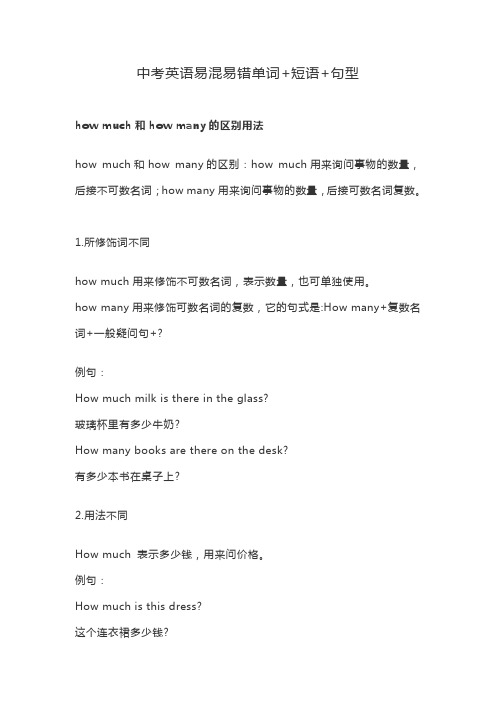
中考英语易混易错单词+短语+句型how much和how many的区别用法how much和how many的区别:how much用来询问事物的数量,后接不可数名词;how many用来询问事物的数量,后接可数名词复数。
1.所修饰词不同how much用来修饰不可数名词,表示数量,也可单独使用。
how many用来修饰可数名词的复数,它的句式是:How many+复数名词+一般疑问句+?例句:How much milk is there in the glass?玻璃杯里有多少牛奶?How many books are there on the desk?有多少本书在桌子上?2.用法不同How much 表示多少钱,用来问价格。
例句:How much is this dress?这个连衣裙多少钱?How many 表示多少,用来问数量。
例句:How many apples do you have?你有多少苹果?in和on的区别用法当我们表示某些东西被其他东西所包围时使用“in”这个词。
而“on”用于描述物体被放置在其他物体上方或外部的情况。
in可表时间,表地点,表手段、方法、材料。
on表示时间、地点、方位等。
1.意思不同in:prep.在... 里;在... 地方;在... 期间on:prep.在... 之上2.用法不同in:in着重一段时间的过程,常用于重复动作或延续动作。
in表示从现在时间算起推移到将来的一段时间之后,一般与将来时态连用。
例句:He is a layman in economics.他对经济学一窍不通。
on:表示“在物体的表面上”,只能用on的表达方式有on the next morning,on the following。
例句:The spider is walking on the ceiling.蜘蛛在天花板上爬行。
3.侧重点不同in:表示“在其中”。
on:表示“在表面”。
初中英语中考常考易混词组辨析(共16组)
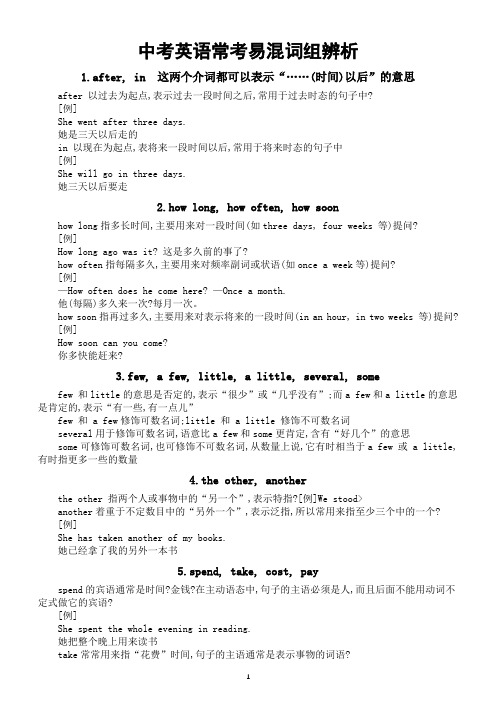
中考英语常考易混词组辨析1.after, in 这两个介词都可以表示“……(时间)以后”的意思after 以过去为起点,表示过去一段时间之后,常用于过去时态的句子中?[例]She went after three days.她是三天以后走的in 以现在为起点,表将来一段时间以后,常用于将来时态的句子中[例]She will go in three days.她三天以后要走2.how long, how often, how soonhow long指多长时间,主要用来对一段时间(如three days, four weeks 等)提问?[例]How long ago was it? 这是多久前的事了?how often指每隔多久,主要用来对频率副词或状语(如once a week等)提问?[例]—How often does he come here? —Once a month.他(每隔)多久来一次?每月一次。
how soon指再过多久,主要用来对表示将来的一段时间(in an hour, in two weeks 等)提问?[例]How soon can you come?你多快能赶来?3.few, a few, little, a little, several, somefew 和little的意思是否定的,表示“很少”或“几乎没有”;而a few和a little的意思是肯定的,表示“有一些,有一点儿”few 和 a few修饰可数名词;little 和 a little 修饰不可数名词several用于修饰可数名词,语意比a few和some更肯定,含有“好几个”的意思some可修饰可数名词,也可修饰不可数名词,从数量上说,它有时相当于a few 或 a little,有时指更多一些的数量4.the other, anotherthe other 指两个人或事物中的“另一个”,表示特指?[例]We stood>another着重于不定数目中的“另外一个”,表示泛指,所以常用来指至少三个中的一个?[例]She has taken another of my books.她已经拿了我的另外一本书5.spend, take, cost, payspend的宾语通常是时间?金钱?在主动语态中,句子的主语必须是人,而且后面不能用动词不定式做它的宾语?[例]She spent the whole evening in reading.她把整个晚上用来读书take常常用来指“花费”时间,句子的主语通常是表示事物的词语?How long will this job take you?你做这项工作要花多长时间?cost 指花费时间?金钱或力气等,只能用表示事物的词做主语,并且不能用于被动语态?[例]How much does the jacket cost?这件夹克多少钱?pay 主要指主语(某人)买某物(或为某事)付多少钱(给某人)?[例]I pay for my rooms by month.我按月支付租金6.among, betweenbetween 的意思是“在……中间,在……之间”,一般指在两者之间?[例]There is a table between two windows.在两扇窗户之间有一张桌子。
(完整版)中考英语易混词汇辨析
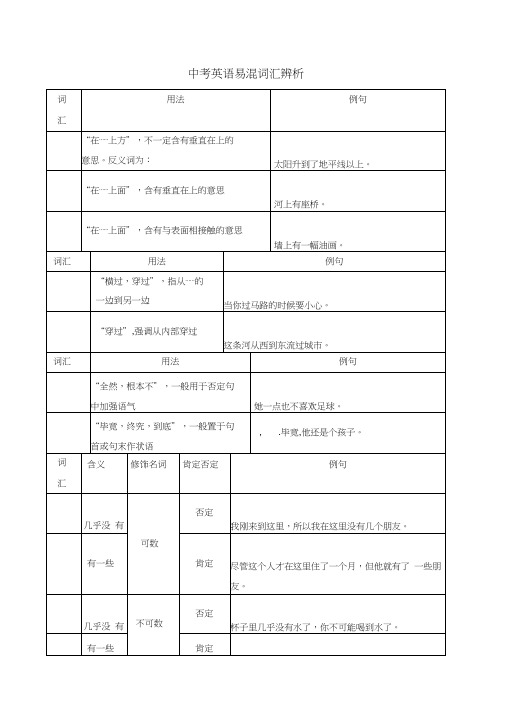
中考英语易混词汇辨析
一种状态的变化,后接形容词或名词他成为了一名医生。
词汇用法例句
表动作,指“去睡觉”
我经常很晚才去睡觉。
也表动作,指进入“睡着”状态
他发现很难入睡。
表动作,意为“刚刚入睡”,指“刚
睡着”的动作
.他刚睡着,这时有人大声敲门。
表状态,意为“睡着的”
这孩子睡着一个小时了。
词汇含义用法例句
发生常指具体事件的发生,特别指那些
偶然的或不能预见的“发生”
?
这事故是怎样发生的?
通常指“(某事)按计划进行或按计划
发生”,此外还有“举行”之意解放以后,发生了巨大变化。
例句
词汇用法
表示“曾经到过某处”,但目前人
不在那儿
? 你到哪儿去了?
表示“去了”,指人已经走了(至少
目前不在说话的地点,在去的途中
或已经到达目的地)
她不在这儿。
她去南京了。
表示“去了某地,并曾在那儿(一段
时间),或现在仍在那儿”她在上海待了几个周了。
词汇用法一言辨义“听到”,强调听的结果,不一定是有意识
的
“听”,强调听的动作,当然未必能听到什
么。
是不及物动词,接宾语时要加
我们仔细地听了半天,但什么也没听到。
词汇用法例句。
中考英语易混淆词汇辨析

中考词汇辨析§1abit/ a little这两个词都意为“一点儿”有时可以互换,但有时不能。
Ⅰ.二者作程度副词修饰形容词、副词、动词或比较级时,意义相同,为“一点儿”“有些”。
如:①Iam a bit /alittlehungry. 我有点饿。
②He walked a bit / a little slowly. 他走路有点慢。
Ⅱ.二者都可以作名词词组,充当主语或宾语。
如:①A little/ bit is enough for me. 我有一点儿就够了。
②I know only a little /abitabout her. 我对她的情况只了解一点。
Ⅲ。
alittle可直接修饰名词;a bit后须加of才可以。
如:①.There isalittlewater inthe bottle. = Thereisabitofwaterin the bottle.[注意]a littleof后的名词通常特指,表“……中的一些”,如:①May I have a little of your tea?Ⅳ.否定形式not alittle 作状语,相当于very/ quite,“很”, “非常”;作定语和宾语时,相当于much, 意为“许多”。
而notabit作状语时,相当于not at all, 意为“一点也不”,作宾语时则相当于notmuch. Eg:①Heisnot a little(=very) hungry.他饿极了。
②He is not abit(=notat all) hungry.他一点也不饿。
③She atenotalittle (=much).她吃得很多。
Ⅴ.Not a bit中的not可以分开使用;not a littl e中的not则不能分开。
Eg:①Hefelt not a bit tired.=Hedidn’tfeel a bit tired.他觉得一点也不累。
②Hefelt notalittletired. 他觉得非常累。
中考英语重点易混淆短语总结精华(推荐)
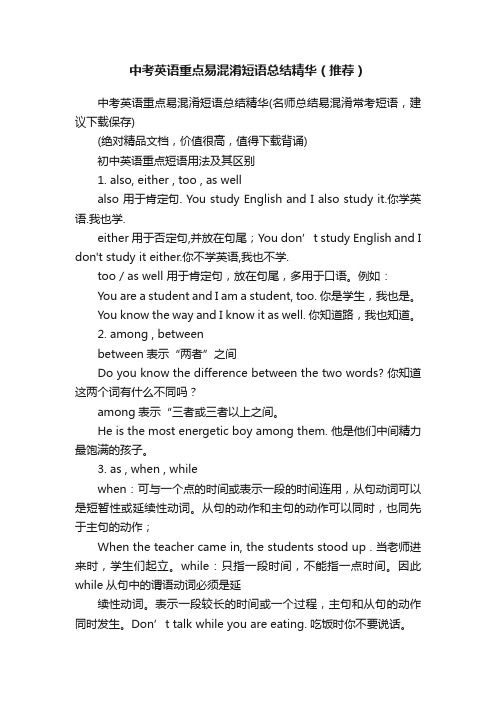
中考英语重点易混淆短语总结精华(推荐)中考英语重点易混淆短语总结精华(名师总结易混淆常考短语,建议下载保存)(绝对精品文档,价值很高,值得下载背诵)初中英语重点短语用法及其区别1. also, either , too , as wellalso 用于肯定句. You study English and I also study it.你学英语.我也学.either 用于否定句,并放在句尾;You don’t study English and I don't study it either.你不学英语,我也不学.too / as well 用于肯定句,放在句尾,多用于口语。
例如:You are a student and I am a student, too. 你是学生,我也是。
You know the way and I know it as well. 你知道路,我也知道。
2. among , betweenbetween表示“两者”之间Do you know the difference between the two words? 你知道这两个词有什么不同吗?among表示“三者或三者以上之间。
He is the most energetic boy among them. 他是他们中间精力最饱满的孩子。
3. as , when , whilewhen:可与一个点的时间或表示一段的时间连用,从句动词可以是短暂性或延续性动词。
从句的动作和主句的动作可以同时,也同先于主句的动作;When the teacher came in, the students stood up . 当老师进来时,学生们起立。
while:只指一段时间,不能指一点时间。
因此while从句中的谓语动词必须是延续性动词。
表示一段较长的时间或一个过程,主句和从句的动作同时发生。
Don’t talk while you are eating. 吃饭时你不要说话。
2024年中考20组必考英语易混词辨析

初中必考20组必考英语易混词辨析——易混词辨析——1、accomplish vs. achieveaccomplish (v.): 完成某项任务。
例子: She accomplished her homework. (她完成了作业。
)achieve (v.): 实现目标。
例子: He achieved his goal. (他实现了他的目标。
)2、advice vs. adviseadvice (n.): 建议。
例子: I need your advice. (我需要你的建议。
)advise (v.): 提供建议。
例子: I advise you to study. (我建议你学习。
)3、allow vs. permitallow (v.): 允许,通常口语化。
例子: My parents allow me to go out. (我的父母允许我出去。
)permit (v.): 允许,通常正式。
例子: The school permits it. (学校允许这样做。
)4、bored vs. boringbored (adj.): 感到无聊的。
例子: I feel bored in class. (我在课堂上感到无聊。
)boring (adj.): 令人无聊的。
例子: The movie was boring. (这部电影很无聊。
)5、careful vs. cautiouscareful (adj.): 小心的。
例子: Be careful with that glass. (小心那只玻璃杯。
)cautious (adj.): 小心翼翼的,避免风险。
例子: He is cautious with money. (他在处理钱时很小心。
)6、common vs. ordinarycommon (adj.): 普遍的。
例子: It is common to use phones. (使用手机是很常见的。
中考英语78个易混易错单词、短语、句型
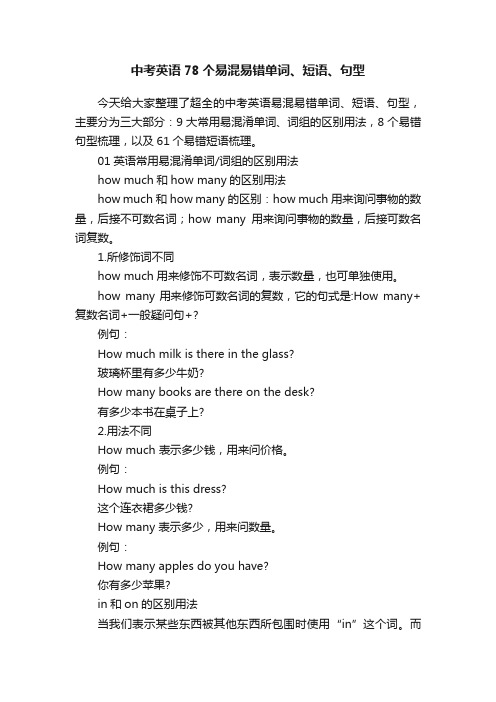
中考英语78个易混易错单词、短语、句型今天给大家整理了超全的中考英语易混易错单词、短语、句型,主要分为三大部分:9大常用易混淆单词、词组的区别用法,8个易错句型梳理,以及61个易错短语梳理。
01英语常用易混淆单词/词组的区别用法how much和how many的区别用法how much和how many的区别:how much用来询问事物的数量,后接不可数名词;how many用来询问事物的数量,后接可数名词复数。
1.所修饰词不同how much用来修饰不可数名词,表示数量,也可单独使用。
how many用来修饰可数名词的复数,它的句式是:How many+复数名词+一般疑问句+?例句:How much milk is there in the glass?玻璃杯里有多少牛奶?How many books are there on the desk?有多少本书在桌子上?2.用法不同How much 表示多少钱,用来问价格。
例句:How much is this dress?这个连衣裙多少钱?How many 表示多少,用来问数量。
例句:How many apples do you have?你有多少苹果?in和on的区别用法当我们表示某些东西被其他东西所包围时使用“in”这个词。
而“on”用于描述物体被放置在其他物体上方或外部的情况。
in可表时间,表地点,表手段、方法、材料。
on表示时间、地点、方位等。
1.意思不同in:prep.在 ... 里;在 ... 地方;在 ... 期间on:prep.在 ... 之上2.用法不同in:in着重一段时间的过程,常用于重复动作或延续动作。
in表示从现在时间算起推移到将来的一段时间之后,一般与将来时态连用。
例句:He is a layman in economics.他对经济学一窍不通。
on:表示“在物体的表面上”,只能用on的表达方式有on the next morning,on the following。
- 1、下载文档前请自行甄别文档内容的完整性,平台不提供额外的编辑、内容补充、找答案等附加服务。
- 2、"仅部分预览"的文档,不可在线预览部分如存在完整性等问题,可反馈申请退款(可完整预览的文档不适用该条件!)。
- 3、如文档侵犯您的权益,请联系客服反馈,我们会尽快为您处理(人工客服工作时间:9:00-18:30)。
2017中考冲刺(重点单词短语+用法归类+易混淆词辨析)1. 冠词,a an 重点记忆an apple\orange\Englishbook\ice-cream\interesting\engineer\eye\umbrella\hour\honest\honor\elephant\ apartment\international\unusuala useful\ university\usual\ uniform\European2. . cost / take / spend / pay 花费花费时间做某事:It takes sb some time to do sth . = sb spend some time (in)doing sth .= sb spend some time on sth .某人花钱买某物:sb spend some money on sth . = sb pay some money for sth . =sth cost sb . some money .※ spend 和pay 主语都是人,cost 主语是物。
※ spent 还可以指“度过”→ How did you spend your weekend ?⑴The sweater ________ me 90 yuan . = I _______ 90 yuan for the sweater .=I_____ 90 yuan on the sweater .⑵He spent lots of money ________ the mobile phone .It ________ her 20 minutes to go home every day . = He ________ 20 minutes ________ home every day .3 .thanks for为…而感谢⑴______ inviting me to your birthday party .thanks to 多亏/由于⑵______ your help .I got good grades4.因为、由于:because( 连词) +从句:( 表示原因)because of(介词短语)+ 名词(短语)= thanks to⑴I didn’t go to school ______ I had a headache .⑵He was late for class ______ the bad weather .⑶He can’t come _____ he is ill .⑷Many people have a cold _____ the cold weather .because和so不能同时连用.5 .How often对频率提问(多久一次)→回答用表示频率的副词或短语How long对一段时间提问(多久)→回答用表示一段时间的状语How soon对将来时间提问(多久)→回答用in+时间段How far询问多长距离(多长)⑴- ______ have you been collecting the kites ? -For ten years .⑵- ______ do you go shopping ? -Sometimes.⑶ - ______ will your father come back ? - In two years .⑷- _____ do you exercise ? - Once a week .⑸- _____ is it from your home to school ? - About ten miles .⑹- _____ are you staying there ? - Two weeks .6. 乘交通工具:take a / the +交通工具在句中作谓语by+交通工具= on a 交通工具在句中作方式状语交通工具有:train/bus/car/taxi/boat/subway/plane…⑴ He takes a bus to bank .= He goes to bank by bus . = He goes to bank on a bus .⑵ I walk to school . = I go to school ______ .※骑自行车、马或驴用ride :ride one’s bike / ride a horse / ride a donkey in one’s car7.到达… reach + 地点get to + 地点reach = get toarrive + in + 大地点arrive + at + 小地点⑴ He reached London yesterday . = He ______ to London yesterday . = He ______in London yesterday .⑵ She arrived ______ the bus station just now . ⑶ You should ______ ( get ) home on time .※当get to和arrive at /in后接地点副词时,都不加介词。
如:get home get there 省略to8.. win (赢得)接a game、war 、a match、a prizebeat ( 打败、战胜)接运动员、球队、对手等。
⑴ Which team ______ the football match ?⑵ Wang Hao ______ Ma Lin and ______ the champion of the Men’s Singles .9.. 借borrow sth . from sb = borrow sb . sth 向某人借某物→ borrow借入lend sth . to sb = lend sb . sth把某物借给某人→ lend 借出keep延续性动词,与一段时间连用。
⑴ Can you lend me your bike ? = Can you ______ your bike ______ me ?⑵ You can borrow some money ____ your brother . = You can borrow your brother ____ ____.⑶ - How long can I ______ the book ?- You can _____ it for two weeks .10. too many太多—修饰可数名词复数→ I have too many rules in my house .too much太多—修饰不可数名词→ Maybe you have too much yin .much too 太—后跟形容词或副词原级→ This coat is much too expensive .⑴ Eating _____ ______ is bad for your health .⑵ It’s ______ ______cold today . You’d better not go out .⑶ There are ______ ______ students in the hallways . It’s dangerous .11. 属于:belong to + 名词/ 人称代词宾格(属于)be + 名词所有格/ 名词性物主代词(是)⑴ It must ______ Ning’s .= It must _________ Ning .⑵ The pencil must be ______ (my) . = The pencil must belong to ______ (my) .⑶ This ball ______ to me .= This ball is ______ .12.the number of + 名词复数(…的数量)作主语,谓语用单数。
a number of + 名词复数(许多、一些)= many⑴ The number of students in our class______ 80 .⑵ ______ number of students are in Helin Middle School .13.. for + 一段时间since + 时间点/过去时的句子⑴ We have been studying English ______ three years .⑵ He has been staying here ______ he was five years old . .⑶ We haven’t seen each other ______ ten years ago .※for和since 可以相互转换。
如:Jenny has been collecting coins for several years .= Jenny has been collecting coins since several years ______ .14.否定祈使句Don’t + v.No + v.ing / n.⑴ Don’t smoke here . = ______ ______ here . ⑵ Don’t take photos. = ______ ______ .15.sometimes不时;有时(是一般现在时的标志词)→Sometimes I go to school by bus . some times几次(此时time是可数名词,意为“次数”)→He has been to Shanghai some times .sometime某个时间(表示在过去或将来的某个时候)→ I saw him sometime last year .some time一段时间(此时time是不可数名词)→ He will stay here for some time .⑴ We are going to have a party ________ next week .⑵ _______ the boy is late for school .⑶ He spent _________ in cutting hair .So he missed the early bus .⑷ Li Jun has been to Bird’s Nest _________ .16. 穿戴:“wear + 衣服/鞋帽/眼镜等(强调状态)→Our teacher often wears a pair of glasses .put on +衣服/鞋帽/眼镜等(强调动作)→Kate puts on her hat and goes out .be in + 颜色/服饰(强调状态)→The girl in red is my sister .dress + 人/反身代词(给某人穿) →She dresses her daughter everymorning .⑴ You’d better ______ your coat . ⑵ She was _______ a flower in her hair .⑶The boy ______ white is my friend . ⑷He is too young to ______ himself .⑸ Miss Li often _____ the white sports shoes .※dress当表示状态时常用be dressed in + 衣物(穿着…颜色的衣服)→He is dressed in a black coat .他常穿着黑色的外套。
